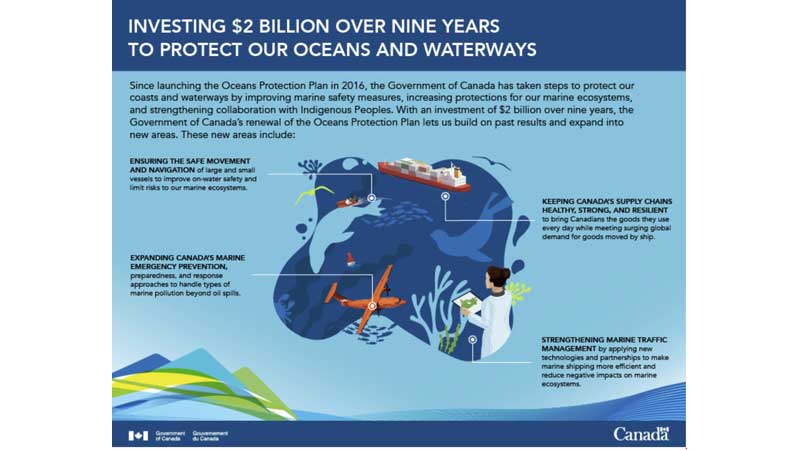The Government Of Canada Invests In Marine Emergency Preparedness, Response And Partnerships As Part Of The Next Phase Of The Oceans Protection Plan
Tuesday, 29 November 2022 08:00.AM
With the longest coastline in the world, keeping our oceans safe and clean is a top priority for the Government of Canada. Since its launch in 2016, the Oceans Protection Plan—the largest investment ever made to protect our oceans and keep our coastlines clean—has led to over 50 initiatives and the completion of more than 300 projects to keep our waters safe and clean from coast-to-coast-to-coast.
To build on this investment in our oceans, today the Minister of Transport, the Honourable Omar Alghabra, announced over $1.2 billion for 29 initiatives as part of the next phase of the Oceans Protection Plan. This investment includes $890.3 million for 19 initiatives to strengthen Canada's marine safety and prevention response. An investment of $337.3 million will be provided for 10 initiatives to support measures that build partnerships between the Government of Canada and Indigenous and coastal communities to better protect our waters.
Since 2016, under the Oceans Protection Plan, the Government of Canada has invested in scientific research and solutions to help make our response to marine incidents—especially oil spills—more efficient and comprehensive. Investments announced today will continue to advance this work and expand it to more areas, including:
• developing a coordinated national pollution response system regardless of location or type of good spilled.
• purchasing new pollution response vessels, communications tools, and equipment—especially for the Arctic.
• developing a national network of trained emergency responders that includes multiple levels of government, Indigenous Peoples, and coastal communities to strengthen marine emergency response—especially in remote communities.
• enhancing science to protect the environment during the cleanup and recovery of a spill.
• growing the Canadian Coast Guard Auxiliary.
The Government of Canada is committed to continuing to work meaningfully with First Nations, Inuit, Métis, and coastal communities in delivering the Oceans Protection Plan and respecting the implementation of the United Nations Declaration on the Rights of Indigenous Peoples Act. Today's funding announcement aims to continue advancing this work, and offers new opportunities for Indigenous Peoples and coastal communities to:
• play a more meaningful role in emergency response and waterway management;
• partner in decision-making; and
• train in marine safety, search and rescue missions, environmental monitoring, and emergency spill response. \
The Oceans Protection Plan is a Canadian success story. When Indigenous Peoples, industry, communities, scientists, and government work together to protect our environment, grow our economy, and support good jobs across the country, we deliver real results. This renewed and expanded Oceans Protection Plan will keep our oceans and coasts safe and healthy; will advance reconciliation, and build a clean future for our children and grandchildren.
"Over the past six years, the Oceans Protection Plan has made marine shipping safer, increased protections for vulnerable marine ecosystems and species, and improved how we respond to marine incidents. As part of this next phase of the Oceans Protection Plan, we are ready to build on this good work—together with Indigenous Peoples, industry, coastal communities, and scientists—to keep our oceans and coastlines safe and environmentally sound for generations to come.
- The Honourable Omar Alghabra , Minister of Transport
Quick facts
• Since 2016, the Government of Canada has dedicated $3.5 billion to the Oceans Protection Plan, making it the largest investment Canada has ever made to protect its coasts and waterways.
• Since its launch, activities under the Oceans Protection Plan have:
○ increased the Canadian Coast Guard presence on all coasts, including modern environmental response equipment, communications tools, radar, new search and rescue stations, and improved infrastructure.
○ improved navigation products and services for mariners in sensitive coastal areas, and high-traffic commercial ports and waterways. These improvements help mariners steer their vessel in a safer manner, using the latest information and technology, including updated charts, weather services, communications and radars.
○ launched the Coastal Nations Coast Guard Auxiliary with the Ahousaht and Heiltsuk First Nations to provide organized voluntary marine search and rescue services in remote coastal areas of British Columbia.
○ funded 42 Indigenous communities to purchase response boats.
○ co-developed the Enhanced Maritime Situation Awareness local waterways near real-time information system with 13 Indigenous communities
○ trained 4,500 people across Canada on emergency programs.
○ supported over 750 people from underrepresented groups—like women, Indigenous Peoples, and Northerners—with training to find jobs in the marine industry.
○ worked with 78 Indigenous groups to study the impacts of marine shipping on the environment and on Indigenous communities.
○ signed the Reconciliation Framework Agreements For Bioregional Oceans Management and Protection, and the Oceans Protection Plan Commitment to Action and Results, with the First Nations Fisheries Council, to better coordinate and collaborate on ocean management and protection priorities.
• On September 30, 2022, Minister Alghabra announced an investment of $50 million in capacity funding to directly support Indigenous partnerships in the Oceans Protection Plan.
• The funding announced today is part of the Government of Canada's Budget 2022 commitment to provide an additional $2 billion to renew the Oceans Protection Plan over nine years to expand its work into new areas.
• Through the next phase of the Oceans Protection Plan, the Government of Canada is further improving how Canada responds to marine emergencies by further strengthening partnerships with Indigenous Peoples for the greater protection, preservation and restoration of our shared oceans and waterways.
SOURCE: Transport Canada
- Related materials:
